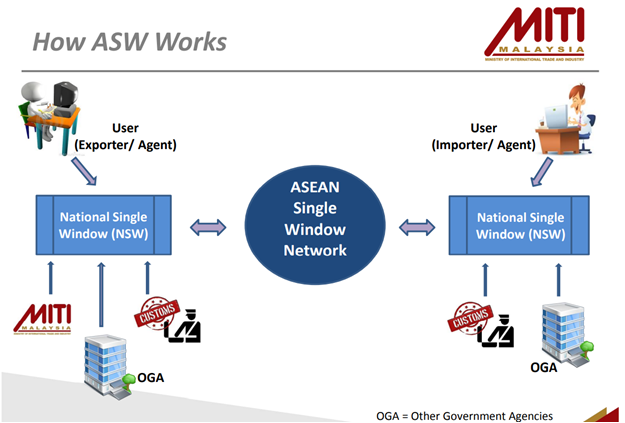A. General Information
ASEAN Single Window (ASW) pilot project
ASEAN Secretariat,
Representatives of Project Management Office, and the funding organization
B. Lessons Learned
The ASEAN single window is a regional system integrating national single windows of ASEAN member states to facilitate exchange in terms of procedures and cost. It allows for a single submission of data, a single synchronous processing of information and a single decision-making for customs
The ASEAN Single Window (ASW) is a regional initiative that connects and integrates National Single Window (NSW) of ASEAN Member States. The ASW objective is to expedite cargo clearance and promote ASEAN economic integration by enabling the electronic exchange of border trade-related documents among ASEAN Member States (AMS).The system enables a single submission of data, a single synchronous processing of information and a single decision-making for Customs release and clearance among AMS and participating countries.
It was originated from the recommendation under Bali Concorde II in 2003 to enhance the competitiveness of ASEAN economies and goods and accelerate the customs clearance of goods and commodities in achieving higher economic efficiency
Exchange of ASEAN Customs Declaration Document(ACDD)
Exchange of ATIGA e-Form D through ASW
Exchange of Electronic Phytosanitary (e-Phyto) Certificates
Exchange of electronic Animal Health Certificate (e-AH)
Exchange of electronic Food Safety Certificate (e-FS)
ATIGA e-Form D is operated fully among all 10 ASEAN members.
In December 2020, 3 AMS namely Cambodia, Myanmar and Singapore started the exchange of the ASEAN Customs Declaration Document (ACDD) through the ASW, followed by Malaysia and Thailand from 31 March 2021. In November, 2021 the Philippines has been given the green light by ASEAN to in the electronic exchange of the ASEAN Customs Declaration Document.
AMS are working on aligning the data structure of electronic Phytosanitary (e-Phyto) Certificate with the International Plant Protection Convention (IPPC) e-Phyto Guideline before planning for the end-to-end test exchange among ready AMS by 2021.
To expand the scope of the ASW, the ASEAN Single Window Steering Committee has developed the roadmap for the exchange of e-document with ASEAN Dialogue Partners (DPs) to identify the mandatory steps including a) feasibility study; b) legal framework establishment; and c) system implementation to enable the exchange of e-documents across the region.
The operation and integration between the NSW of participating ASEAN member states in the secured ASW environment which comprise data exchange and reporting mechanism.

Customs Declaration Document(ACDD)
ATIGA e-Form D
E-phyto certificates
The operation and integration between the NSW of participating ASEAN member states in the secured ASW environment which comprise data exchange and reporting mechanism.
Planning and preparation costs could be high and financial constraints remain an issue and implementation of the ASW pilot is very much dependent on external funding. and the government budget of each ASEAN member state.
The clear business process and all circumstances which the officials and traders practiced and encountered in the as-is situation must be completely identified before moving toward the to-be situation supported by electronic environment to ensure the less impact and improvement would be occurred in the on-board project.
More effective and efficient deployment of resources, Correct and increased revenue yield, Improved trade compliance, Enhanced security, Increased integrity and transparency, Reduced costs decreased delays, Faster release and clearance.
- Increase the participation by all ASEAN member states
- Exchange the additional e-document via ASW environment
- Enhance the public outreach and the collaboration with the business sectors

